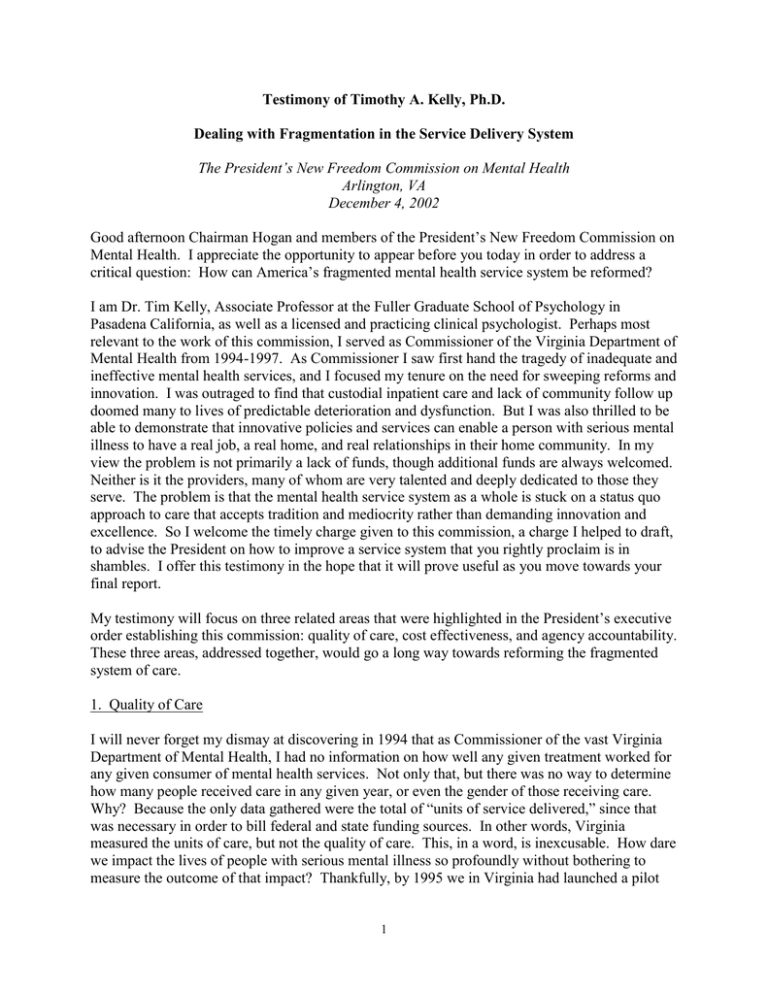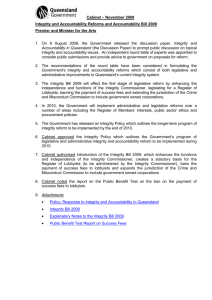Good afternoon Chairman Hogan and members of the President’s New... Mental Health. I appreciate the opportunity to appear before... Testimony of Timothy A. Kelly, Ph.D.
advertisement

Testimony of Timothy A. Kelly, Ph.D. Dealing with Fragmentation in the Service Delivery System The President’s New Freedom Commission on Mental Health Arlington, VA December 4, 2002 Good afternoon Chairman Hogan and members of the President’s New Freedom Commission on Mental Health. I appreciate the opportunity to appear before you today in order to address a critical question: How can America’s fragmented mental health service system be reformed? I am Dr. Tim Kelly, Associate Professor at the Fuller Graduate School of Psychology in Pasadena California, as well as a licensed and practicing clinical psychologist. Perhaps most relevant to the work of this commission, I served as Commissioner of the Virginia Department of Mental Health from 1994-1997. As Commissioner I saw first hand the tragedy of inadequate and ineffective mental health services, and I focused my tenure on the need for sweeping reforms and innovation. I was outraged to find that custodial inpatient care and lack of community follow up doomed many to lives of predictable deterioration and dysfunction. But I was also thrilled to be able to demonstrate that innovative policies and services can enable a person with serious mental illness to have a real job, a real home, and real relationships in their home community. In my view the problem is not primarily a lack of funds, though additional funds are always welcomed. Neither is it the providers, many of whom are very talented and deeply dedicated to those they serve. The problem is that the mental health service system as a whole is stuck on a status quo approach to care that accepts tradition and mediocrity rather than demanding innovation and excellence. So I welcome the timely charge given to this commission, a charge I helped to draft, to advise the President on how to improve a service system that you rightly proclaim is in shambles. I offer this testimony in the hope that it will prove useful as you move towards your final report. My testimony will focus on three related areas that were highlighted in the President’s executive order establishing this commission: quality of care, cost effectiveness, and agency accountability. These three areas, addressed together, would go a long way towards reforming the fragmented system of care. 1. Quality of Care I will never forget my dismay at discovering in 1994 that as Commissioner of the vast Virginia Department of Mental Health, I had no information on how well any given treatment worked for any given consumer of mental health services. Not only that, but there was no way to determine how many people received care in any given year, or even the gender of those receiving care. Why? Because the only data gathered were the total of “units of service delivered,” since that was necessary in order to bill federal and state funding sources. In other words, Virginia measured the units of care, but not the quality of care. This, in a word, is inexcusable. How dare we impact the lives of people with serious mental illness so profoundly without bothering to measure the outcome of that impact? Thankfully, by 1995 we in Virginia had launched a pilot 1 project measuring actual clinical outcomes for the first time, that has since been implemented statewide. But such data are still all too rare in both the public and private sectors. And even when such data are available, there is often tremendous resistance to feed the data back into the system so as to improve the quality of care on a real-time basis. In the President’s executive order, he charged this commission to “review the current quality and effectiveness of public and private providers” and to “focus on the desired outcomes of mental health care.” (Sec.3.(a) & Sec.4.(a)). This core component of your mission cannot be accomplished without addressing the need for standardized, reliable clinical outcome data to be widely used as a matter of course. Since that which is measured tends to get better, such data will invariably and inevitably improve the quality of care. It is analogous to turning on a light in a dimly lit room – making it possible to see what is working well and what is not. It is also a very important way of increasing the voice of consumers in the service system, since most outcome data are comprised of what the consumer has to say regarding satisfaction with services and real-life outcome of care. Some are concerned that clinical outcome data could be misused if confidentiality is not maintained, if there are negative consequences for providers working with treatment-resistant consumers, or if the additional administrative burden is not recompensed. They are right on all counts, but the answer is not to remain content with the status quo of little usable data. Rather, it is to ensure that these legitimate concerns are well addressed up front. Outcome data have the potential of rapidly improving the quality of services as the mental health system moves from tradition-based to evidence-based care. At the same time, it is essential that confidentiality is guaranteed, that data are not used punitively, and that administrative costs are adequately covered. All this can be done. The commission is uniquely positioned to provide national leadership on this critical and timely matter, especially through the subcommittee on evidence-based practices. The final report could include a review of the many well-established inpatient and outpatient clinical outcome assessment packages, a strong recommendation for the widespread use of a selection of standardized measures, and recommended safeguards for avoiding any misuse of data. The National Institute for Mental Health, together with the Agency for Health Care Planning and Research, could be directed to take a lead role in developing and promoting a catalogue of appropriate outcome measures, and procedures for their use. In my view, such recommendations would spark evidence-based reforms that would in turn lead to dramatic improvements in the quality of care and quality of life for people with serious mental illness. 2. Cost Effectiveness As Virginia’s mental health commissioner, I found that the public sector spent approximately $1 billion yearly on services for Virginians with mental illness, mental retardation, or substance abuse needs. Of this total, about $400 million went to maintaining 15 psychiatric facilities all across the state. The facilities were originally built to care for approximately 14,000 patients, but were now caring for less than 4,000, yet no facility had ever closed. The net effect was a drain of resources that could have gone to innovative and effective community services such as Assertive Community Treatment. But the political difficulty of closing a facility in a powerful 2 state legislator’s district and redirecting those funds to new community care proved to be insurmountable. Unfortunately, Virginia still has 15 facilities draining mental health resources. This is but a dramatic example of a phenomenon that is all too frequent – the waste of valuable mental health resources on ineffective care. It is not compassionate to continue to fund services that are ineffective or unnecessary, because those precious funds could be redirected to innovative community care. Accordingly, it is imperative that policymakers and program managers set a high priority on continual program review, ensuring that sacred cows are not spared and that funds are allocated to those services that are most needful and most effective in the lives of consumers. This is of course easier said than done, as there is predictable resistance to any effort to redirect funds away from traditional programs. However, we simply do not have the luxury of wasting any dollars – not so long as there is one consumer whose needs are unmet. Your enabling executive order states that “the commission shall focus on those policies that maximize the utility of existing resources by increasing cost effectiveness and reducing unnecessary and burdensome regulatory barriers” (Sec.4.(c)). Thus the President has charged you with addressing the matter of cost effectiveness head on, including the related goal of reducing needlessly burdensome regulatory barriers. Here too the commission is positioned to make a potentially historic contribution to mental health policy. Your final report could call for determined fiscal leadership at the federal, state, and county levels so that no sacred cows are allowed to prevent the redirection of funds to that which is most effective and most needed by consumers. A list of specific examples of appropriately redirected mental health funding, such as occurs when an unneeded hospital is closed and funds invested in new community services, could be included as models for policymakers’ consideration. You could also propose relief of regulatory burden by calling for block-granting state and federal funds to providers, but with the critical provision that resultsoriented outcome data must be generated for funding to continue. In this way, innovation and positive outcomes could become the watchwords of a cost-effective, high-quality mental health service delivery system. 3. Agency Accountability In your enabling executive order, the President charges the commission to “ensure that all its recommendations promote innovation, flexibility, and accountability at all levels of government” (Sec.4.(e)). This requires taking a careful look at federal mental health agencies such as SAMHSA and NIMH, state mental health agencies, and county mental health clinics. Are all of these agencies operating at the peak of their performance capabilities, embracing innovation and welcoming accountability to those served? Or is there a tendency to protect turf, resist change, and avoid measures of accountability? The truth is that there is some of both, but too much of the latter. As Virginia’s mental health Commissioner I had the pleasure of working with some of the most dedicated and talented providers I have ever known – men and women who have a huge heart for those they serve. But 3 I also found what no-doubt each of you has found at times. There is an inevitable pull in any large organization towards bureaucratization and mediocrity. Too often, the status quo is embraced at all costs, and innovation scorned simply because it’s too much trouble. I have three accountability recommendations for your consideration, based on the three levels of government involved. Regarding the federal level, the commission could recommend strategies for coordinating and restructuring the various mental health agencies around the goal of evidence-based reforms. Currently the multiple agencies are fragmented, and their organizational structures tend to reflect the status quo expectations of their historic constituencies. The commission could recommend that the President and the Congress collaborate to review and restructure these agencies to enable them to lead the nation with a single voice towards long-overdue reforms. Regarding state mental health agencies, the commission must of course recognize the principles of federalism and avoid un-funded mandates. Nonetheless, recommendation could be made for state legislators to take greater responsibility for the quality of their state’s mental health care. This could mean requiring their mental health agency to institute outcome measurement for all providers, and publish the resultant findings regularly. Such data, which would of course be aggregated to protect privacy, would allow both policymakers and consumers to meaningfully evaluate the effectiveness of care in any given program. Regarding county mental health clinics, recommendation could be made for state legislators to consider actually transforming the current monopolistic public mental health system into a new system marked by open competition and open quality of care information. This could mean, for example, directing the state agency to contract for facility and community care in the open market. It could also involve the use of consumer vouchers. An open and competitive system would provide choices in care for the consumer, as well as real motivation for quality improvement and innovation among providers. These recommendations, addressing all three levels of government, would enable mental health agencies to lead the way into a much-needed new system of care rather than perpetuating the old by default. Agency accountability leads inevitably to innovation, flexibility and reform. Conclusion In conclusion, I believe that the President’s New Freedom Commission on Mental Health has provided an historic opportunity to dramatically improve the quality of life for Americans with serious mental illness, by launching national mental health reform. But to do so, you must address equally all the charges given in the President’s enabling legislation. The three areas I have focused on – quality of care, cost effectiveness, and agency accountability – have not yet received adequate attention. So now comes the hard part. I encourage each of you to embrace these three related areas and ensure that the final report prominently addresses each one. Taken together, they would transform a fragmented system of care – a system currently in shambles. Taken together, they would spark a national reform of mental health services and create a new, 4 evidence-based system of care that welcomes innovation, outcome measures, and accountability for services provided. Why is reform so important? Because effective services allow Americans with serious mental illness to count on having a real job, a real home, and real relationships in their home communities. In a word, it allows them to come home to us. Please do not let this historic moment slip from our hands. Thank you Chairman Hogan for this opportunity to present my testimony. I ask that you include in the public record the attached paper entitled “Principled Mental Health System Reform” which addresses many of these same issues. *The paper, “Principled Mental Health System Reform,” to which Dr. Kelly refers, can be found on the website of the Heritage Foundation, www.heritage.org. 5



